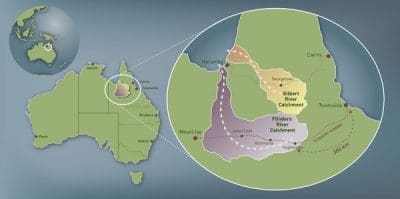AUSTRALIA’S largest cattle producer says proposed new vegetation management laws soon to be passed in Queensland will jeopardise a multi-million dollar irrigated fodder production and cattle finishing project it has planned for the State’s Gulf region.
Australian Agricultural Company chief executive officer Hugh Killen told a parliamentary inquiry examining Queensland’s Vegetation Management and Other Legislation Amendment Bill 2018 in Brisbane this morning that the new laws will risk development of an important new export industry for Queensland, “with no material environmental benefit at all”.

The Queensland Government issued a tender for 95,000 Ml of new irrigation water from both the Flinders and Gilbert Rivers last year. Click on image to enlarge.
Mr Killen said the laws will have considerable unintended impacts on AA Co’s proposed Gulf Water project in particular, into which it has already invested $8 million with “significantly more investment planned”, and which, if achieved, would create jobs for about 60 people.
The proposed legislation will, among other things, ban broadscale clearing of remnant vegetation for agriculture and will prohibit clearing for high value agriculture and irrigated high value agriculture.
Mr Killen said AA Co had entered into a Queensland Government tender of unallocated water rights in the Gulf Water Resources plan last year, and had subsequently been granted a portion of those water rights.
Operating under the existing legislation, AA Co had already invested millions of dollars toward the project’s development, which will use irrigation to produce fodder and run thousands of additional high value animals per year.
“This is a significant project,” he said. “If completed we would improve the productivity of around several hundred thousand hectares of land in the Gulf.”
Irrigated high value agriculture in the Gulf would set up not only AA Co but the wider industry to produce high quality food all year round, Mr Killen said, supporting Australia’s ambitions to be a major source of food for Asia and the world.
However, by removing high value agriculture as a relevant purpose for clearing under the Act, the new legislation would put development in the region in jeopardy, Mr Killen said.
“This would require a full environmental impact statement, or impact assessment report, for any clearing required under this project,” he said.
“And this would be required for any clearing whatsoever on land which has already been used for agriculture to date.
“The additional cost and the uncertainty in time delay inherent in these processes will put our water rights and our proposed investment in jeopardy.
“And beyond this they will impact the development of a new export industry for Queensland, with no material environmental benefit at all.”
He said the project would use local suppliers and businesses and would generate significant flow on investment for the local community.
AA Co’s operations in Queensland alone span 2.4 million hectares of country, comprising 10 properties it owns in the State and additional leased land.
When asked by LNP member for Buderim Brent Mickelberg if AA Co had been consulted by the Queensland Government on the proposed legislation, he said it had not.
He said he believed the risk created to the project was an unintended consequence of the proposed legislation, and said the company wanted to work with the Queensland Government.
“AA Co is committed to working in partnership with Government, with industry and with our communities to achieve genuine sustainability,” he said. “This is really non-negotiable for us, we will continue to work together to drive sustainability.”
Mr Killen said AA Co’s number one priority was “the wellbeing and sustainability of our people, of our animals and most importantly of our land.”
He added that while there had been considerable debate about the legislation in relation to protecting Great Barrier Reef catchments, the company’s Gulf project did not impact on the Great Barrier Reef at all.
“We are asking this committee to consider the considerable investment we have made to secure water rights in the Gulf and to understand that the significant jobs and export benefits of this project are an unintended victim of these changes,” he said.
He called on the committee to consider expanding the exemptions in the proposed changes to include the Queensland Government’s gulf water rights tender in 2017, and to consider increasing the time available for consultation on the proposed changes.
“We expect there will be other unintended consequences from these changes and these deserve to be identified and fully considered.”
Asked by Mr Meckelberg what effect the proposed legislation would-have on AA Co’s ability to grow its agricultural production in Queensland, he said it would effect how it deployed capital.
“Anything that changes that seriously makes us consider how we make investments, so if this was to change we would have to seriously consider further development in regions such as the Gulf.”



HAVE YOUR SAY